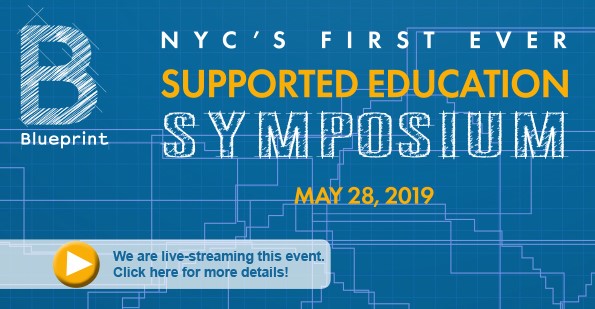
Community Access, home of Blueprint, hosted NYC’s first ever Supported Education symposium May 28th, in observance of May being Mental Health Awareness Month. This critical event was focused on promoting equity in access to education and developing improved supports for students with a history of mental health concerns, including those with justice involvement. It was a huge success with over 150 attendees in person and online. We had a packed line up of 9 different presentations and workshops to choose from, a panel discussion, and strategic planning session to close. Here are some of the highlights from this action packed and thought-provoking day. You can see the full agenda and watch the recorded livestream here https://www.communityaccess.org/events/supportededucationsymposium.

Professor Lies Korevaar from Hanze University, The Netherlands, kicked off the day with his keynote address 'Building a Supported Education Network: Lessons Learned in Europe'. He started with some light-hearted quips about New York’s origins as New Amsterdam, before moving on to helpful reflections on the development of the European Network on Supported Education (ENSEd). He advised starting with a small group of dedicated individuals before expanding and maintaining face to face contact, through meetings and events such as the symposium.
The presentations that followed highlighted the range of Supported Education provision we have here in New York City. Fountain House, showcased the Clubhouse and Social Participation models, demonstrating how these benefit their members with impressive outcomes. Michael Stipkala from Community Links reflected on the mutuality of the work we do during his presentation on a Peer approach to Supported Education. In our presentation 'Education, Wellness, and Justice: Supported Education in the NYC Context'. Blueprint’s very own Louise Harkins (Director), Jonathan Payne (Supported Education Specialist), and Carlo Rastaldo (Participant) presented on the complex intersection of mental health and the criminal justice system, and the role Supported Education can play in overcoming some of the challenges faced by individuals with a history of involvement in both. Carlo bought some of these issues to life by sharing his personal story and poignant mantra “School is my therapy”.


Other featured guests were ACCES-VR, presenting what services they provide and how to enroll, NYSED/CUNY CareerKit project, a comprehensive career preparation resource for teachers and counselors in New York State, Rutgers University and a workshop on Enhancing Academic Performance in Students through Intentional Support, as well as the College of Staten Island’s Center for Student Accessibility, presenting advocacy for those with disabilities in an academic setting. Professor Korevaar’s colleagues from the Netherlands, explored such topics as when and whether to disclose a mental health diagnosis in an educational setting, as well as introducing some Cognitive Remediation strategies.

This full day closed with our two plenary sessions. Firstly, the panel on cultural competency when working with justice involved students. These discussions provided much food for thought, including panelist Chrissy Cunningham’s suggestion to reconsider and reimagine the concept of ‘Cultural Competency’ as ‘Cultural Humility’, positing how we cannot truly become competent in understanding someone else’s unique life experiences. Lastly, we had the strategic planning session 'Next Steps: Forming a NYC Supported Education Network', facilitated by Blueprint’s Tara Donahue (Supported Education Specialist) and Henry Weng (Participant). These discussions circled back on the insights from the Keynote Address on the European Supported Education Network and identified a number of key issues and functions for a similar local network, such as; sharing best practices, informing public policy, developing training materials, creating a referral network, and furthering the evidence base for Supported Education. All attendees expressed a desire to initiate a Supported Education Network here in New York City, to meet the unique needs of the populations we serve. So watch this space…
